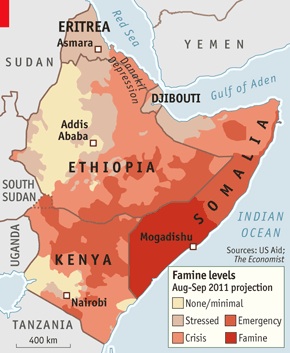Somalia – reinforcing failure, starving success?
Written by PeterHere’s a good article by ex-British diplomat Carne Ross on the subject of governance, famine and the 11 year failure of the international community’s policy on Somalia.
Without stable governance Somalia is unlikely ever to be free from periodic famine. Is it time for the international community to accept the reality on the ground and try reinforcing success?


Discussion (4 Comments)
If you want to link to things about Somalia written by people who actually are knowledgeable, i’d suggest looking at the black guys – http://mogadishuman.wordpress.com/ , for starters. Or you could also stick to making fun of Jean-François, which appears to be much more on your level of competence.
Matthias.
Not sure what your point is about the relevance of skin colour to expertise?
But thanks for the link. Very interesting blog. I imagine he and Carne would have an interesting exchange, given that they seem to be saying very similar things about the failure of international policy in the region.
Correlation doesn’t imply causation : it isn’t because they both agree that there is failure that they think that the failure has the same causes, or even the same cures. Everyone with a modicum of common sense or knowledge will come to the same conclusion (that international policy has failed dramatically).
Anyone taking Somaliland as an example of anything in the country instantly discredits himself in my book, just because the histories and social structures are so different to south and center. The government doesn’t control much outside of Hargeisa (where the neighborhoods are divided on clan lines) and, to a degree, Berbera. And why is the skin color relevant ? Because the Somalis who do speak out are infinitely more knowledgeable about what goes on inside the country than any diplomat who doesn’t have the first clue of the reality outside of his hotel room or cushy escorted trips – Pham’s deposition to congress, which Carne links to, is based in part on empirical study that lasted… 4 days. Wow, color me impressed.
This said, Carne is likely smart and knowledgeable enough to know the story, the interests and the people behind the Jubbaland example he uses. Unfortunately, he doesn’t seem to realize that it is perceived at best as a joke, and at worse as a new cassus belli (depending on who you talk to). Calling Somaliland and Puntland “peaceful” entities is a fucking joke, too, unless you choose to forget that they almost went at war with each other last year. He also knows why spending more to combat piracy on shore is impossible, but understandably avoids getting into it. There was a resounding success at a stabilization process outside of Somaliland : the Islamic Courts Union in ’06. Who did the americans choose to send in to solve the ICU problem ? Well, the ethiopians, yes, but also the TFG president at the time, who happened to be one of the founders of the state of… Puntland. That he also choses to forget, as well as the Ethiopians, and Yussuf’s, truly remarkable track record in Mogadishu. I could go on, and on, and on. But please… Listen to the black guys.
They might not agree as to causation no, but it would be an interesting discussion.
I agree that Somaliland is certainly markedly different in history, clan and social structures than South and Central Somalia. And it’s not necessarily a workable model for other regions of the country. But its difference is the point – exactly the reason why an international policy effort that treats Somalia as one coherent entity doesn’t make much sense. Carne is certainly an advocate for Somaliland independence, unsurprising since he works for them, but I don’t think he makes strong value judgment about either the merits of Puntland or Jubaland – he just notes that they exist. As for whether Somaliland and Puntland could accurately be called peaceful – their ‘wars’, whether actual or almost, are pretty insignificant in scale when you compare them to what’s happening to the South.
I’d agree that the rise of the ICU in 2006 was in part a result of popular desire for stability in the face of the warlordism that preceded it. But was it really likely to develop into a lasting, strong and stable government for Southern and Central Somalia? An academic question in any case – it never had a chance. The Ethiopian response to the prospect of a united, strong and possibly hostile Somalia was in keeping with a long-held central tenet of their foreign policy. They’d have gone in independently, even if the US had objected (though I’m sure they didn’t).
Thanks again for your post and for the link.